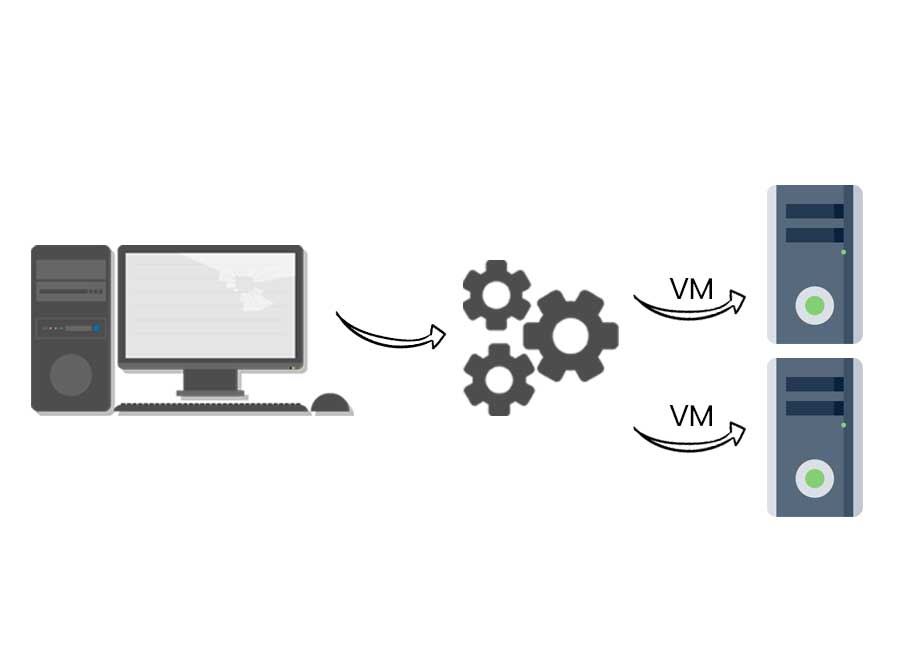How EMR Solutions Improve Patient Safety and Preventative Care

5 Signs Your Business Needs a CRM Solution and How to Choose the Right One
July 9, 2024
Importance of Law Practice Management Software
September 27, 2024Introduction
In many hospitals and clinics, the absence of advanced technology often leads to inefficiencies and potential errors. Imagine a doctor sifting through piles of paper records to find a patient’s history, or a nurse struggling to read handwritten notes on a prescription. These outdated methods slow down the process and increase the risk of mistakes that could harm patients.
However, technology has revolutionized the medical field, bringing in innovations that streamline operations and enhance patient care. One such innovation is the Electronic Medical Records (EMR), which has transformed how medical information is recorded, stored, and accessed.
What Does EMR Mean?
EMR, or Electronic Medical Records, are digital versions of patients’ paper charts maintained by hospitals or clinics. Unlike Electronic Health Records (EHRs), EMRs are typically confined to a single practice or department. EHRs, on the other hand, are designed to be shared across various departments, allowing for a more comprehensive view of a patient’s health history.
Isn’t it astonishing? Things formerly done on paper and pen can now be done digitally with EMR. In short, using an EMR allows you to keep all of your data in one location, making it easier to handle patient data. EMR solutions are crucial in improving patient safety and preventative care, ensuring that hospitals or clinics have accurate and up-to-date information at their fingertips.
How EMR Boosts Patient Safety
EMR solutions ensure the safety of every single patient by preserving all patient data in an organized and easily accessible manner. Gone are the days when doctors and nurses had to sift through stacks of paper records to find critical information. With EMRs, all patient information, from medical history to current medications, is stored digitally and can be accessed instantly. This reduces the likelihood of errors with manual record-keeping, such as misreading handwriting or losing important documents.
Moreover, EMRs utilize complex algorithms to provide timely alerts and reminders. For instance, they can notify healthcare providers about potential drug interactions, allergies, and other critical health issues before they become problems. This proactive approach significantly reduces the risk of adverse events and enhances the overall quality of care. EMRs also streamline ordering tests and treatments, ensuring patients receive the appropriate care promptly.
By integrating EMR solutions, hospitals and clinics can enhance patient safety, improve clinical outcomes, and ensure a higher standard of care. These solutions support hospitals and clinics in making informed decisions, ultimately leading to safer and more effective patient care.
Reducing Errors
Human errors have always been a risk in every field, and we cannot deny this. However, we cannot afford such mistakes in the medical area because doctors deal with patients’ lives and deaths. EMR can reduce both human and logical mistakes. According to a study, EMR has reduced medical errors by 55%, increasing people’s reliance on this solution. For example, automated alerts for incorrect dosages or potential drug interactions, and elaborate on the cited study for credibility.
Quick Access to Information
Imagine you’re in an emergency room, and the doctor needs to know if you’re allergic to any medications. In such critical situations, a timely response can save the life of your patient. With EMR, you can quickly pull up your records and get the information needed instantly. This can be a lifesaver, quite literally. EMRs can provide real-time access to patient data, including allergies, past medical history, and current medications, which can be critical for immediate decision-making.
Better Coordination Among Healthcare Providers
Using ERM, the entire personnel of that particular hospital can access the same data. Whether you visit with your doctor or a pharmacist, you do not need to memorize your health issues because they already have them, reducing the chance of contradicting prescriptions or treatments.
Data Security And Developing Patient Trust
You do not have to be concerned about your private information if you visit a hospital that uses an EMR solution. To begin, practically all hospitals now support such a solution to provide better care to their patients. Once they have created trust with their patients, they begin to hope for their survival, which can solve a variety of problems.
How EMR Enhances Preventative Care
Preventing diseases is more effective than investing significant time and money in treating them later. Timely preventive measures are invaluable in maintaining health and well-being. EMR solutions play a pivotal role in enhancing preventative care by providing a comprehensive and continuous view of a patient’s health history. These solutions enable healthcare providers to identify risk factors and early warning signs more efficiently, allowing for timely interventions that can prevent the onset of serious conditions.
With EMR, patients no longer need a personal caregiver to constantly oversee their health. EMRs automatically track and remind both patients and providers about important preventative measures, such as vaccinations, routine screenings, and follow-up appointments. This proactive approach ensures that critical health checks are not missed, which is particularly important for managing chronic diseases and conditions that benefit from early detection.
Additionally, EMR solutions facilitate better patient education and engagement. Patients can access their health records, understand their risk factors, and follow personalized care plans developed in collaboration with their healthcare providers. This empowerment leads to more informed and proactive health management, fostering a partnership between patients and their healthcare teams.
By integrating EMR solutions, hospitals and clinics can significantly enhance preventative care, leading to healthier populations and reduced healthcare costs. These solutions support a shift from reactive to proactive healthcare, where prevention becomes a key focus, ultimately improving patient outcomes and quality of life.
Reminders And Alerts
EMR solutions have been created such that they may schedule reminders for things like flu shots, mammograms, immunizations, and other check-ups. These reminders help you stay in control of your health. If you don’t have time to take care of yourself, don’t worry; ERM has a lot.
Tracking Health Trends
Patients can benefit from the fact that through EMR solutions, doctors can observe changes in the patient’s condition over time. For instance, if your blood pressure has been on a continuous rise, then your doctor will advise on changes you need to implant in your lifestyle or the therapies you need before it escalates. Also, if you occasionally get small ailments, your doctor will recommend that you take measures to help you avoid getting worse.
Personalized Care Plans
This way the doctors can plan your care in a much more specific since all your data is in one place. They can assess your medical problems, family problems, and your way of living to advise you on what better way you can prevent diseases. It can thus be seen that adopting such an approach for one’s diet can help positively towards a generally healthy life.
Key Benefits of EMR
We cannot afford to disregard the numerous advantages of this solution. To develop trust in this solution, you must first understand its benefits.
Highly Efficient
A well-developed EMR solution strives for zero errors, guaranteeing precision and accuracy without any room for even the slightest mistake.
Cost Effective
Another significant benefit of this technology is its high cost-effectiveness. Once you’ve invested in EMR, all operations can be efficiently handled through the solution, eliminating the need for additional staffing to manage data.
Enhanced Patient Care Results
Improved patient care outcomes have a major impact on treatment efficacy, which increases patient survival rates.
Key Features of EMR Solutions That Improve Patient Safety and Preventative Care
Comprehensive Patient Records
EMR solutions provide a complete and organized digital repository of patient records, including medical history, diagnoses, medications, immunizations, and test results. This comprehensive view helps healthcare providers make well-informed decisions quickly, reducing the risk of errors associated with paper records.
Real-Time Access and Updates
With EMR, patient information is updated in real-time and accessible from multiple locations within a healthcare facility. This ensures that all healthcare providers involved in a patient’s care have the latest information, improving coordination and reducing the likelihood of mistakes.
Decision Support Tools
Advanced decision support tools within EMR solutions analyze patient data to provide evidence-based recommendations and alerts. These tools help healthcare providers make informed decisions about diagnostics, treatment plans, and preventative care strategies, thereby improving patient outcomes.
Secure and Confidential Data Handling
EMR solutions are designed with robust security features to protect patient data. They ensure that sensitive health information is stored securely and accessed only by authorized personnel, maintaining patient confidentiality and trust.
Enhanced Patient Engagement
EMR solutions often include patient portals that allow individuals to access their health records, view test results, and communicate with their healthcare providers. This fosters greater patient engagement and empowers individuals to take an active role in their health management.
Efficient Workflow and Reduced Administrative Burden
By automating administrative tasks such as billing, appointment scheduling, and prescription refills, EMR solutions reduce the workload on healthcare staff. This allows providers to spend more time focusing on patient care and preventive measures.
Improved Coordination of Care
EMR solutions facilitate seamless communication and information sharing among different departments and specialists within a healthcare organization. This improved coordination ensures that all aspects of a patient’s care are aligned, enhancing both safety and the effectiveness of preventive measures.
By incorporating these features, EMR solutions significantly improve patient safety and enable more effective preventative care, ultimately leading to better health outcomes and a higher standard of care in healthcare facilities.
Notable EMR Solutions
We cannot afford to disregard the numerous advantages of this solution. To develop trust in this solution, you must first understand its benefits.
OpenEMR
OpenEMR is a popular open-source EMR solution used worldwide. It provides a comprehensive suite of features, including patient scheduling, electronic billing, and medical charting. OpenEMR is highly customizable, allowing healthcare providers to tailor it to their specific needs. Its open-source nature also means it is continually improved by a community of developers, ensuring it remains up-to-date with the latest healthcare standards and practices. OpenEMR’s flexibility and cost-effectiveness make it an excellent choice for small to mid-sized practices looking to implement a robust EMR system without significant financial investment.
Praxis EMR
Praxis EMR is a well-known EMR system used by many healthcare providers in the United States. It is renowned for its AI-driven engine, which learns from the physician’s practice patterns and adapts to their workflow, enhancing efficiency and reducing the time spent on documentation. Praxis EMR emphasizes usability and customization, enabling healthcare providers to create a system that closely aligns with their clinical approach. Its unique Concept Processing technology allows physicians to document patient encounters more naturally and intuitively, making it a popular choice for many independent practices.
Conclusion
EMR solutions are revolutionizing the healthcare landscape by significantly enhancing patient safety and preventative care. These digital solutions ensure that medical records are accurate, organized, and easily accessible, eliminating the inefficiencies and risks associated with traditional paper records. Through features like real-time updates, automated alerts, decision support tools, and secure data handling, EMRs empower hospitals or clinics to deliver high-quality, informed care. They also engage patients by providing access to their health information and reminders for important preventative measures.
The integration of EMR solutions leads to better-coordinated care, reduced errors, and more efficient workflows, all of which contribute to improved patient outcomes. By prioritizing preventative care, EMRs help identify health risks early and facilitate timely interventions, ultimately fostering a proactive approach to health management. For hospitals and clinics, adopting EMR solutions means not only enhancing patient safety but also building trust with patients through secure and efficient handling of their health data. For any hospital or clinic aiming to stay ahead in this digital age, embracing EMR solutions is not just an option—it’s a necessity.







